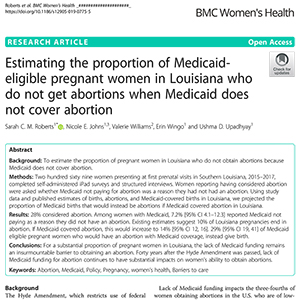 The Hyde Amendment, first passed in 1976, forces Medicaid to deny insurance coverage of abortion in almost all circumstances. This lack of insurance coverage impacts the majority of people who obtain abortion in the United States. A 2009 systematic review of the literature on the impact of the Hyde Amendment found that about one fourth of women who would have had abortions instead gave birth when Medicaid does not cover abortion. This study investigated whether that estimate is still relevant.
The Hyde Amendment, first passed in 1976, forces Medicaid to deny insurance coverage of abortion in almost all circumstances. This lack of insurance coverage impacts the majority of people who obtain abortion in the United States. A 2009 systematic review of the literature on the impact of the Hyde Amendment found that about one fourth of women who would have had abortions instead gave birth when Medicaid does not cover abortion. This study investigated whether that estimate is still relevant.
Researchers conducted surveys and structured interviews with women entering prenatal care in Southern Louisiana, a state where Medicaid does not cover abortion, and asked women about whether they had considered abortion for this pregnancy and, if so, whether lack of Medicaid coverage of abortion was a reason they had not had an abortion. Researchers then used estimates from the study data as well as estimates of births, abortions, and births covered by Medicaid in Louisiana to estimate the proportion of low-income women who would have had abortions but instead give birth when Medicaid does not cover abortion.
Findings confirm the statistic from the systemic review: About one fourth of Medicaid-eligible pregnant women give birth instead of having an abortion because Medicaid does not cover abortion. This confirms that the restrictions imposed by the Hyde Amendment are an insurmountable barrier to obtaining an abortion for women.
The study, “Estimating the proportion of Medicaid-eligible pregnant women in Louisiana who do not get abortions when Medicaid does not cover abortion,” is available from BMC Women's Health.
